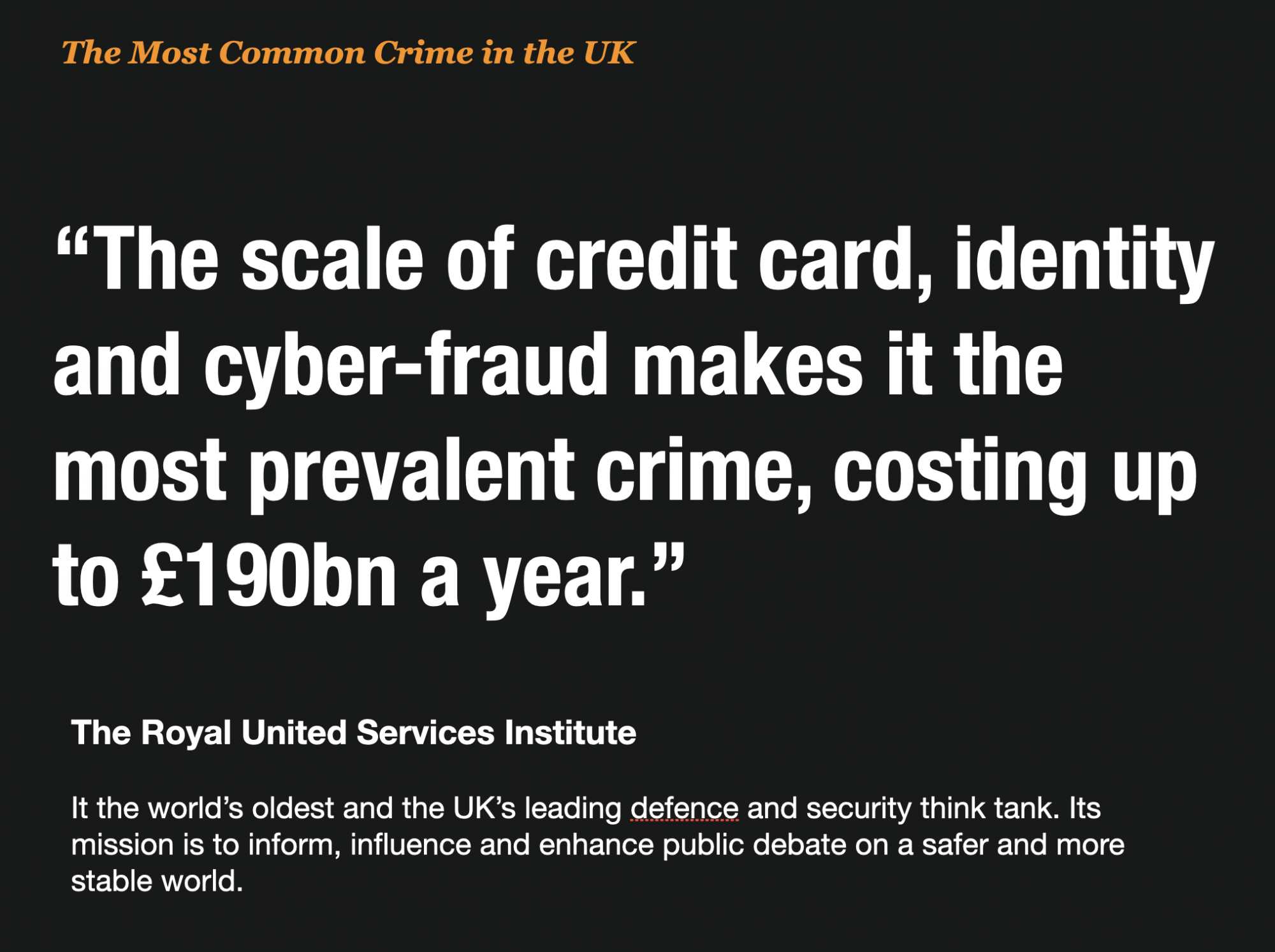A think tank in the UK – the Royal United Services Institute (RUSI) advises that fraud has reached such epidemic levels that it should now be considered a threat to national security.
The report by RUSI called The Silent Threat The Impact of Fraud on UK National Security, warns that fraud against UK citizens, businesses, and the UK public purse has reached epidemic levels – it is the ‘volume crime of our time.
They are raising the red flag because it is the crime that UK citizens are most likely to fall victim to, and failures in the response to it have the capacity to undermine public confidence in the rule of law.
A recent report on BBC.com reiterated the finding, and reports that the scale of credit card, identity and cyber-fraud makes it the most prevalent crime, costing up to £190bn a year.

The UK Has Become A Target for International Fraudsters
“The UK has become a target destination for global fraudsters,” according to the RUSI.
But that’s a statement that is hard to quantify. According to the BBC, one senior fraud professional interviewed by the researchers said that despite 30 years of investigating fraud, they still had no idea what proportion of the threat emanated from overseas.
More Attention Should Be Paid To Fraud in the UK
The RUSI reports primary findings included the following themes:
- UK intelligence agencies should play a bigger role in investigating fraud
- Investment in police resources should be increased and that the police should work better with the private sector
- The scale of fraud against the private sector has an impact on the reputation of the UK as a place to do business
- The extraordinary amounts of money lost are nothing short of heist of taxpayers money across the UK.
The report goes at great lengths to communicate the absolute seriousness of how the growth of fraud is reaching epidemic levels and something must change.
The Think Tank Made 14 Recommendations to the UK Government
The think tank made 14 separate recommendations and grouped those recommendations into 3 categories
- The UK should mobilize a national security response to fraud now
- The UK should treat fraud as a serious and organized crime
- The UK should treat fraud as a terrorist financing method
Recommendation 1: The National Security Council (NSC) should commission a new ‘whole of system’, public–private strategy for tackling fraud.
Recommendation 2: The 2021–26 National Cyber Security Strategy should establish a more explicit mandate for GCHQ in protecting the public from cyber fraud and should lay out a long-term resourcing plan for the National Cyber Security Centre Suspicious Email Service.
Recommendation 3: The National Police Chief’s Council should commission a review to build synergies between the specialist fraud and cyber capabilities within policing, including exploring the benefits of functional mergers.
Recommendation 4: The ‘Government Counter Fraud Profession’ should be explicitly noted within National Security Objective 3 as part of critical government infrastructure and a means of protecting UK economic security and prosperity.
Recommendation 5: A new ‘whole of system’ public–private fraud strategy (see Recommendation 1) should specifically lay out an action plan for improving the enforcement response to frauds against businesses, using a range of criminal and civil tools.
Recommendation 6: The NSC should issue a high-level intelligence requirement to the National Crime Agency (NCA) and the intelligence agencies to improve the national understanding of fraud as an organized crime. The NCA needs sufficient resourcing to achieve this.
Recommendation 7: The Strategic Policing Requirement should be amended to emphasize fraud as a serious and organized crime priority, led by the NCA, to ensure specialist resources are available for the investigation of serious and organized fraud.
Recommendation 8: A key goal of the National Economic Crime Centre’s Public-Private Operational Board should be greater cross-dataset exploitation between fraud and serious and organized crime as a means of better understanding the threat from organized fraud.
Recommendation 9: The government should actively revisit the role that effective digital ID schemes can play in protecting against all forms of fraud, including as a tool for countering fraud for terrorist financing purposes, as part of its National Data Strategy.
Recommendation 10: Agencies charged with distributing benefits and government support should receive basic training on how to identify terrorist financing vulnerabilities and should make greater use of tech-based tools, such as IP address monitoring and geo-location tools, to ensure service users’ locations are consistent with their supposed status.
Recommendation 11: Embedded positions for HMRC and Department of Work and Pensions staff in the National Terrorist Financial Investigation Unit should be maintained to help spot fraud disruption opportunities.
Recommendation 12: Emphasis should be placed on ensuring the necessary skills are maintained to ensure fraud investigation remains a key tool in the armoury of counterterrorism policing, with additional training on fraud investigation and prosecution provided where necessary.
Recommendation 13: The UK’s Joint Money Laundering Intelligence Taskforce Terrorist Financing Working Group and the Joint Fraud Taskforce should establish a new cross-taskforce working group



